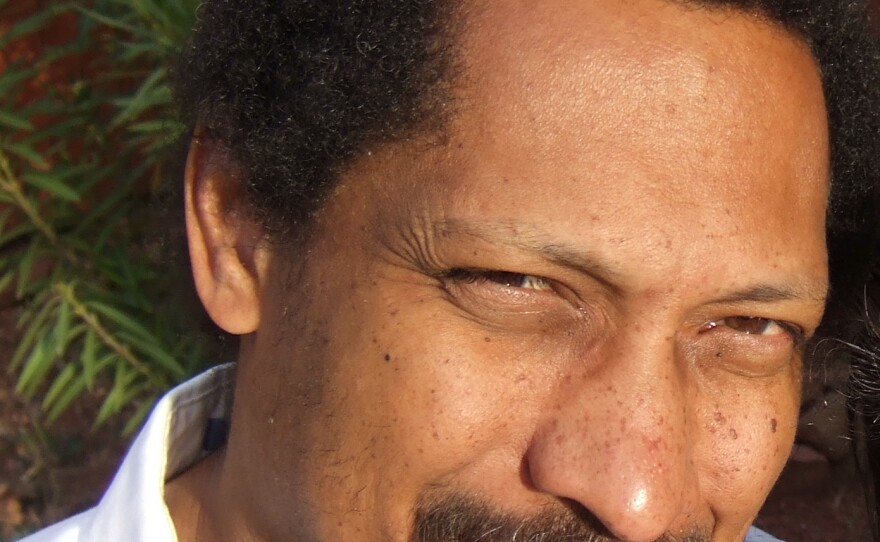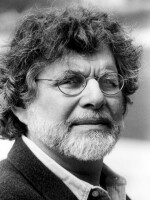A friend of mine, with more than half a lifetime in the business of writing and a following of devoted fans, some years ago nailed a sign on the wall above his writing desk.
TELL THE [Expletive] STORY!
How I wish Percival Everett looked up every now and then from his keyboard to see a sign like this.
Everett is one of the most gifted and versatile of contemporary writers, with over 20 works of fiction to his name, novels and stories that show us our own country at an angle just slightly tilted toward the antic. Though at first glance we don't often take his characters to be odd, his crusading hydrologists, drug-mad western lawmen, played-out baseball stars, eccentric women, nasty politicians, muddle-headed academics and inquisitive writers make up a population both slightly crazed and utterly revealing of the American dream (and nightmare).
When Everett tells these stories in a direct manner — even in novels as varied in style as the realistic Watershed and the feverish American Desert -- his work takes hold of us and won't let go.
But there's an unfortunate aspect of his aesthetic that occasionally raises its head, leading to work that seems forced and pedantic. In these books, he reveals just how deeply he's been seduced by the idea of metafiction, the modernist notion that all writing is really only about itself and that the writer should work in an ironic, self-reflective fashion. The books composed under the thrall of this longstanding (yet apparently still voguish) tendency are not his best. They tend to be mainly satirical, as in, for example, his novels Glyph and Erasure. If your taste runs to the brilliant expression of contemporary nihilism disguised as intellectual inquiry, these novels may entertain you.

In this new book, Everett, a character himself, gives us a series of encounters with his father in a nursing home, where the old man has gone to go to pieces. As the book moves along, the question of the narrator's identity constantly comes into play — is it the younger Everett who is narrating or is it the father? Or the painter or the physician, characters whom the father seems to have conjured up in a manuscript that the son seems to have appropriated?
Real, fascinating, important dramas lie buried beneath distracting passages of self-referential rhetoric: stories of adultery and abandonment, the persistence of violence in American life and time's inevitable drift away from the beginning of things toward an undesirable end. Occasionally — as when we get a thread of narrative about a lonely horse-owning narrator's encounter with a female veterinarian, or the physician character's encounter with a meth-lab family — the pages pulse with the force that Everett often makes us feel in his more traditional fiction.
But these flashes don't last. Metafictional asides and intrusions clog the flow of the story and drag down what might have been a fine novel about fathers and sons. The Everett narrator, however, doesn't see things this way. "There are no realities that are more real than others, only more privileged," says the father — or is it the son? It's all deliberately muddled.
It's never good for art when critical jargon takes precedence over narrative sense. Whether modernist or what critics today call postmodernist, this approach leaves a story gasping for air. The greatest modernists, from Joyce and Woolf onward, experiment with technique not as an end in itself — or not only so — but to find new ways to write about life, in all its breadth and depth.
Speaking through the mouth of the father, the novelist tries to laugh off such criticisms. At one point, the Everett character asks what thing in his father's career irked him the most. "Son, it was being called a postmodernist," the father answers. Elaborating, he maintains he doesn't even know what that means. "Some asshole tried to explain it to me once, said that my work was about itself and process and not about objective reality and life in the world."
"What did you say to him?" the son asks. "I asked him what he thought objective reality was," the father replies. "Then I punched him."
If only this new novel had deployed more of that punch!
Copyright 2023 NPR. To see more, visit https://www.npr.org. 9(MDAzMjM2NDYzMDEyMzc1Njk5NjAxNzY3OQ001))






